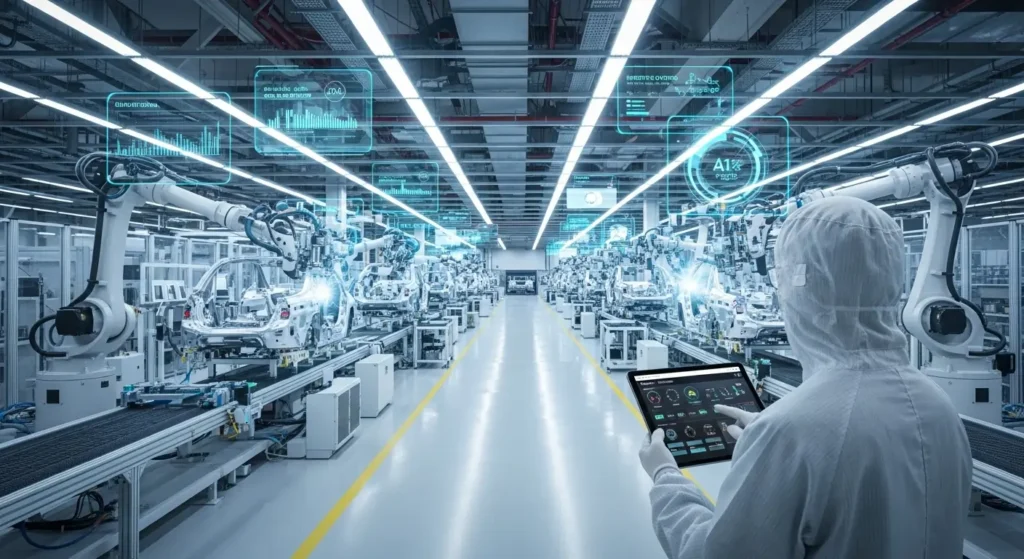Brussels, Belgium – The European Commission today launched a landmark €1 billion “Apply AI” strategy, a strategic initiative designed to accelerate the adoption of artificial intelligence across key industries and reduce the continent’s reliance on American and Chinese technology.
The move signals a determined push towards what officials are calling “technological sovereignty.”
The comprehensive plan, unveiled by Brussels policymakers on October 8, 2025, will channel funding into critical sectors including healthcare, manufacturing, energy, and automotive to foster the development and deployment of “made-in-Europe AI.
“I want the future of AI to be made in Europe,” declared Commission President Ursula von der Leyen, emphasizing the goal of finding “smarter, faster, and more affordable solutions” through widespread AI adoption.
This major funding initiative aims to bolster Europe’s position in the global AI race, where it has been seen as lagging behind the US and China.
The strategy encourages an “AI first” policy, urging companies and public sector entities to prioritize AI-powered solutions.
Strategic Sectors to a Leading-Edge Future

The “Apply AI” strategy will prioritize investment in eleven key areas to maximize its impact on European competitiveness and innovation.
Key Targeted Sectors Include:
- Healthcare and Pharmaceuticals: Establishing a network of AI-powered advanced screening centers to revolutionize diagnostics and improve cancer detection.
- Manufacturing and Robotics: Integrating autonomous AI technologies to create smart factories, enhance predictive maintenance, and increase productivity.
- Energy: Utilizing AI for grid optimization and to improve weather forecasting through open-source models.
- Automotive and Mobility: Accelerating innovation in autonomous vehicles with designated cities serving as testbeds.
- Defense and Security: Developing sovereign frontier models to bolster command-and-control systems and advance space defense technology.
Additional sectors set to receive targeted support include communications infrastructure, agri-food production, construction engineering, creative media, and climate technology.
A Multi-faceted Funding and Governance Approach

The €1 billion in funding will be sourced from existing EU programs, primarily Horizon Europe and the Digital Europe Programme.
This investment is expected to be matched by member states and further supplemented by private sector participation.
To oversee this ambitious undertaking, the EU is establishing a new governance framework.
The Apply AI Alliance will bring together industry leaders, academics, and public sector representatives to ensure the strategy’s real-world applicability.
An AI Observatory will continuously monitor trends and the impact of AI adoption across the continent.
A key component of the infrastructure push is the creation of AI gigafactories.
These large-scale facilities will provide researchers and startups with access to the immense computational resources required for developing and training advanced AI models.
This initiative is part of a broader €20 billion “InvestAI” plan aimed at transforming Europe into a leading hub for AI innovation.
Also See- UK AI Clinical Trial Reforms Cut Approval Times in Half
Building a Future-Ready Workforce and Regulatory Environment

Recognizing that technological advancement must be supported by human capital, the strategy includes provisions for workforce development.
An AI Skills Academy and other training programs will be launched to prepare for the jobs of the future and support career transitions.
This initiative operates within the framework of the EU’s landmark AI Act, the world’s first comprehensive regulation on artificial intelligence, which aims to ensure the development of trustworthy and human-centric AI.
To aid companies, particularly small and medium-sized enterprises (SMEs), in navigating the new regulations, an AI Act Service Desk has been established.
Pilot programs for the “Apply AI” strategy are slated to begin in early 2026 across five member states, with a full rollout anticipated over the following three years.
The initiative is projected to significantly shorten the research-to-market time for new AI technologies.